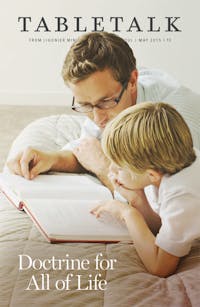
Request your free, three-month trial to Tabletalk magazine. You’ll receive the print issue monthly and gain immediate digital access to decades of archives. This trial is risk-free. No credit card required.
Try Tabletalk NowAlready receive Tabletalk magazine every month?
Verify your email address to gain unlimited access.
It’s a thrilling episode—Martin Luther, standing before the Diet of Worms, the only faithful Christian in his day, proclaiming his God-given right to read the Bible however he saw fit: “Unless I am convinced by my self-determined understanding of Scripture, I will not recant. Here I stand, I can do no other.”
Obviously, I’ve embellished the account. No historically informed Protestant would say outright that Luther was the only faithful believer in His day. Neither would an informed Protestant confess that Luther’s protest came from his private reading of Scripture apart from the work of his theological forefathers and contemporaries.
Yet I fear that the way many people tell Luther’s story betrays an implicit belief that the German Reformer was a mad individualist for whom the supreme arbiter of truth was his own opinion and who sought to turn the church into a collection of like-minded individuals with no theological authority over its members. But while Luther’s work was driven in large measure by his quest for a personal assurance of salvation, he was not a radical individualist. Luther certainly didn’t endorse the belief that we should have “no creed but the Bible” or that the work of studying and formulating doctrine is left up to the individual.
Yet that is how Luther is often read—as one who taught that we formulate doctrine on our own, that we take the Scriptures and approach them as if we are blank slates without preconceived notions about what they mean. If we do that, however, we will surely err in our doctrine.
As I think on the various doctrinal errors I’ve held in my lifetime, I see that I went wrong because I held the second of the two aforementioned assumptions. For years, I read Romans 8–9 as most non-Reformed people do, namely, that God “looked down the corridor of time” and decided to choose for salvation those whom He saw would choose to believe in Christ once they heard of Him. I thought I was discerning that meaning because I was bringing no preconceived notions to the text, that I was reading the text apart from extrabiblical tradition. In truth, however, I was following a theological tradition that was unconsciously assumed in my church environment. I did not see that reality because I was not thinking carefully about my background, and had been taught little about my theological heritage.
I do not want to be too hard on my church at the time, for most churches—even Reformed churches—spend little time in self-conscious reflection on their theological tradition. But when we are unaware of the preconceptions we bring to the text, we have little hope of discerning whether our traditions are actually taught in Scripture. If we do not know the beliefs we bring to the text, we cannot see where they rightly or wrongly govern our reading of God’s Word. Tradition, not Scripture, ends up controlling us.
By the Lord’s grace, I have been largely spared from the other assumption that leads to doctrinal error, namely, that we are to be “lone ranger” theologians who formulate doctrine on our own. History is littered with bad and heretical “biblical” doctrines “discovered” by those who thought they did not need the community of God’s people in order to understand biblical doctrine. Joseph Smith founded Mormonism because he decided that he did not need the established church to help him with doctrine, indeed, that the established church was actually a hindrance to biblical understanding. That left Smith a polygamous polytheist who died at the hands of an angry mob.
God never meant for us to study doctrine as isolated individuals. The study and formulation of doctrine is first and foremost a communal doctrine. After all, the Lord revealed Himself to a corporate body. The Bible is not written just to me personally but to all the saints of God. Thus, God designed us to plumb the depths of His revelation together as individual congregations and larger church assemblies. There should be no such thing as autonomous doctrinal study, but we should examine doctrine in concert with our forebears and contemporaries. We should read their works, check our reading of Scripture against theirs, and doubt our conclusions if no one else has reached them. In this, the reformers are our model. Though they affirmed the Bible as the sole infallible source of doctrine, they understood the proper role of God’s corporate people in knowing His truth. They charged that the medieval church had abandoned the best of its earlier thinking, but did not say that we should cast off all who studied Scripture before us.
In sum, we will also go wrong in our doctrine if we are unconscious of our traditions. The pharisees were unaware that much of what they believed was not from Scripture, so they confused later interpretations with divine revelation. Thus, they could not recognize Jesus as the Messiah. Likewise, if we do not know the pedigree of our beliefs, how will we be able to compare them with Scripture? We will also go wrong in our doctrine when we exalt ourselves and ignore our traditions. A little humility and awareness of our heritage will go a long way toward keeping us on the path of sound doctrine.
